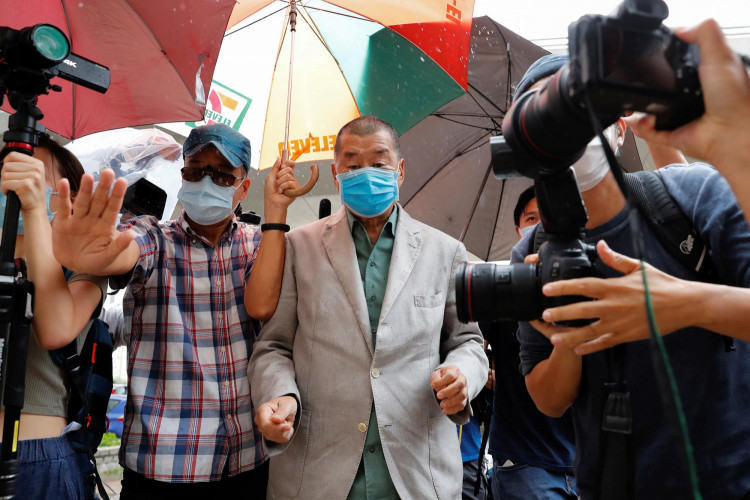Hong Kong media mogul and pro-democracy activist Jimmy Lai appeared in court Wednesday, taking the stand for the first time since his arrest nearly four years ago. The 77-year-old founder of the now-shuttered pro-democracy tabloid Apple Daily faces charges under the city's sweeping national security law. If convicted, Lai could face a life sentence, marking a significant test case in Beijing's crackdown on dissent in Hong Kong.
Dressed in a green cardigan and brown blazer, a visibly thinner Lai smiled and waved to his family in the courtroom gallery. Among them was Cardinal Joseph Zen, a vocal pro-democracy supporter and longtime friend. As he prepared to testify, Lai's presence drew a crowd, with some supporters braving rain and cold outside to show solidarity.
The trial, which resumed after a lengthy pause, centers on charges of colluding with foreign forces under a national security law imposed by Beijing in 2020. Prosecutors allege that Lai's Apple Daily published articles calling for sanctions against Hong Kong and Chinese officials, thereby threatening national security. Lai, who has pleaded not guilty, faces two counts of collusion and an additional charge of conspiracy to publish seditious materials.
Lai's case highlights the broader clampdown on dissent in Hong Kong following the 2019 pro-democracy protests. His testimony, delivered hoarsely but growing stronger with each statement, traced his journey from clothing tycoon to media figure. "I thought it was a good opportunity... to participate in delivering information which I think is freedom," Lai said, reflecting on his decision to launch Apple Daily after the 1989 Tiananmen Square massacre.
Lai's appearance in court coincides with mounting international criticism over Hong Kong's crackdown. British Prime Minister Keir Starmer, meeting Chinese President Xi Jinping at the G20 summit, raised concerns about Lai's imprisonment and health. "We're concerned by reports of Jimmy Lai's deterioration," Starmer told Xi. Lai holds a British passport, and his case has become a flashpoint for Western governments advocating for his release.
While Lai's trial unfolds, the broader crackdown continues. On Tuesday, more than 40 pro-democracy figures were sentenced to prison terms of up to 10 years on subversion charges in another national security trial. Among them was activist Joshua Wong, who defiantly declared, "I love Hong Kong," before being led away. These sentences, along with Lai's case, underscore Beijing's efforts to reshape Hong Kong's once-thriving civil society and media landscape.
The prosecution has argued that Lai's newspaper and his overseas lobbying efforts amounted to incitement and collusion with foreign powers. Prosecutors have named several U.S. and British politicians, including former Secretary of State Mike Pompeo, as alleged collaborators in efforts to undermine Chinese sovereignty. Lai's defense contends that his activities ceased once the national security law took effect in mid-2020.
China's Foreign Ministry in Hong Kong dismissed international criticism of Lai's trial, labeling him "a key instigator of anti-China activities" and accusing him of "colluding with external forces." The Hong Kong government has repeatedly framed national security prosecutions as necessary to maintain stability, rejecting claims that they undermine freedoms guaranteed under the city's Basic Law.
Lai's presence in court has galvanized public support from some quarters, with onlookers like Chiu Mei-ying stating, "Lai represents the spirit of Hong Kong." The trial is being heard by three judges appointed by a national security committee, a feature of Hong Kong's national security cases that eliminates the right to a jury.
The international spotlight on Lai's trial underscores concerns over press freedom and civil liberties in Hong Kong. Reporters Without Borders (RSF) ranked Hong Kong 135th out of 180 countries in its 2023 press freedom index, a steep decline from 18th place in 2002. The erosion of freedoms has prompted many independent media outlets to shut down or relocate, as critics accuse Beijing of turning the city into a reflection of mainland China's restrictive environment.






